2021-2022学年牛津译林版英语九年级上册Unit3单元复习课件(35张PPT)
文档属性
| 名称 | 2021-2022学年牛津译林版英语九年级上册Unit3单元复习课件(35张PPT) | 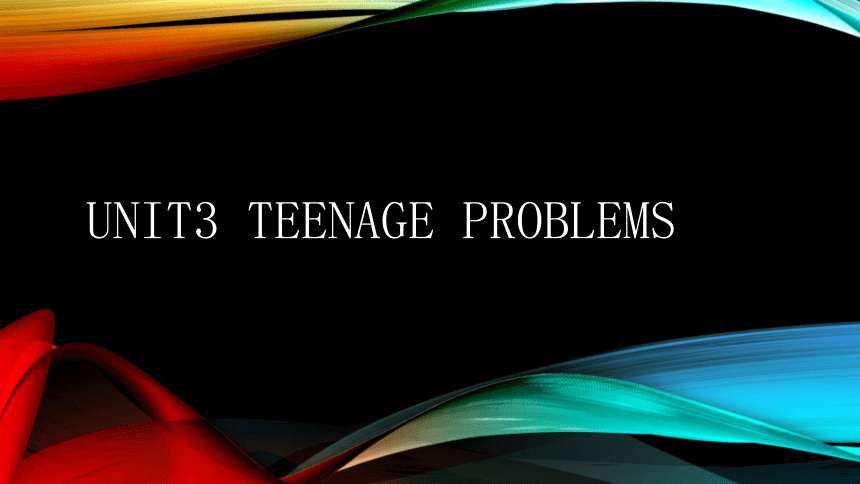 | |
| 格式 | zip | ||
| 文件大小 | 49.5MB | ||
| 资源类型 | 教案 | ||
| 版本资源 | 牛津译林版 | ||
| 科目 | 英语 | ||
| 更新时间 | 2021-10-16 22:40:25 | ||
图片预览


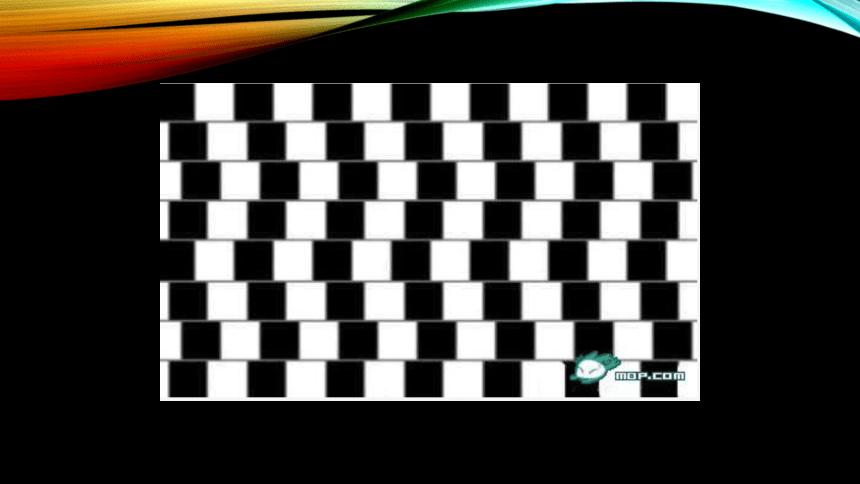
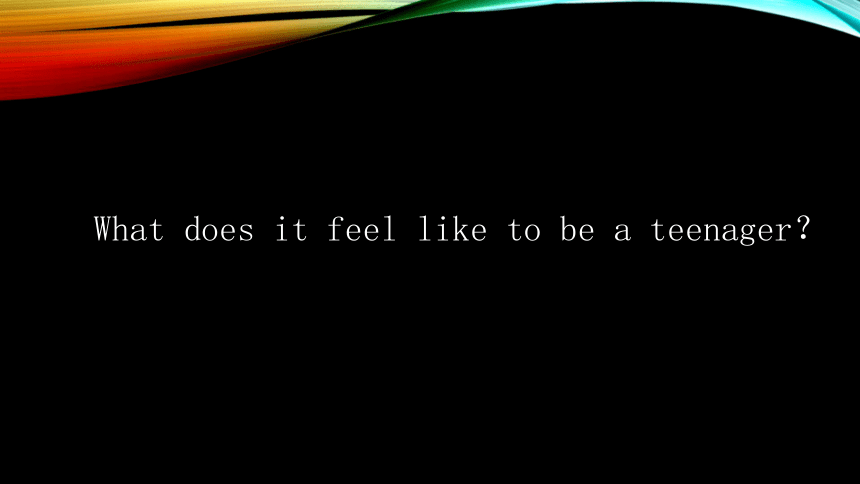
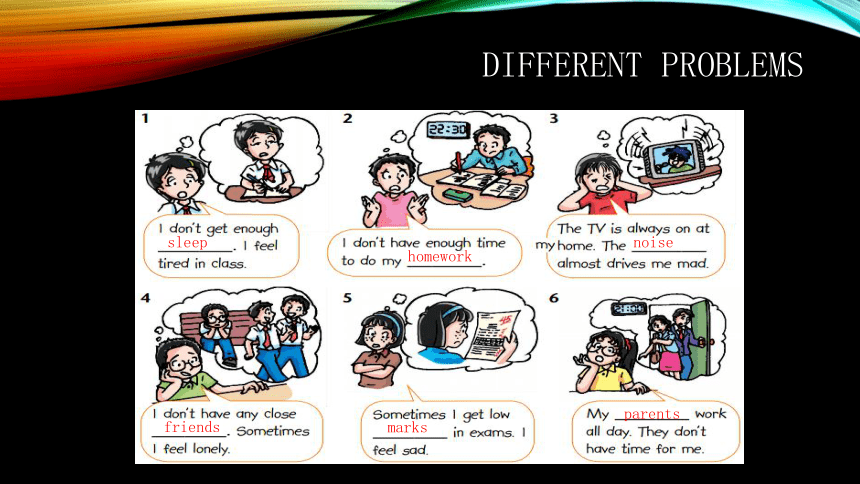
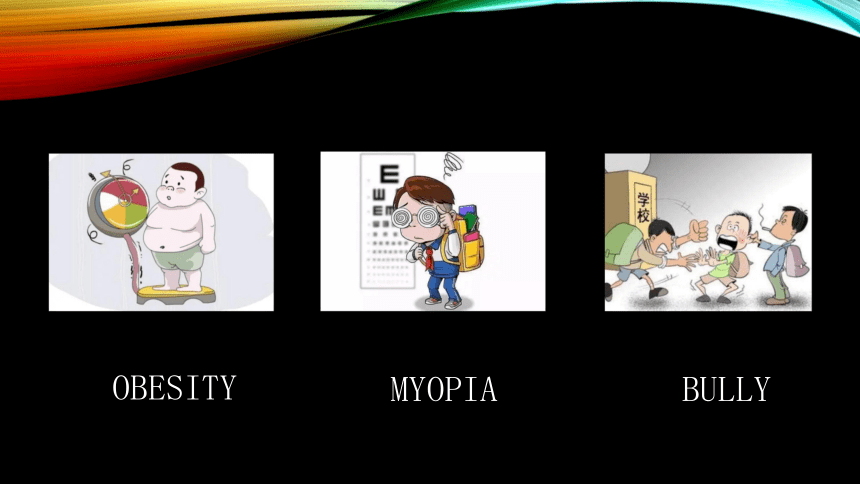

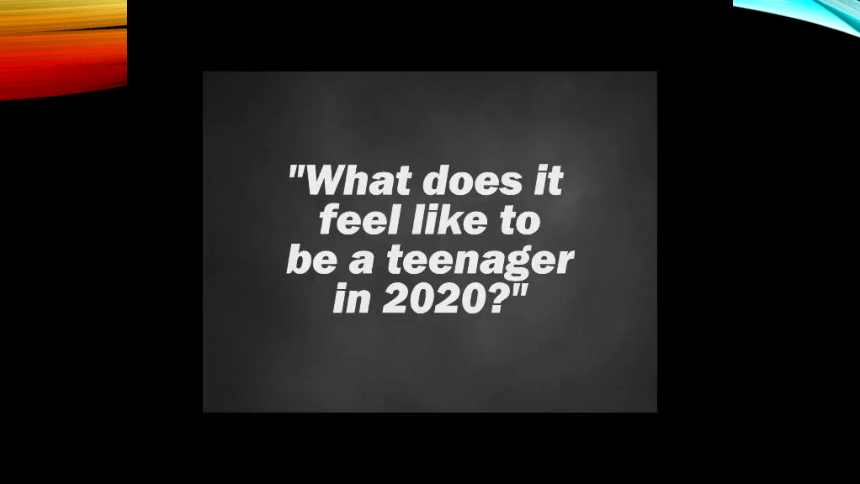
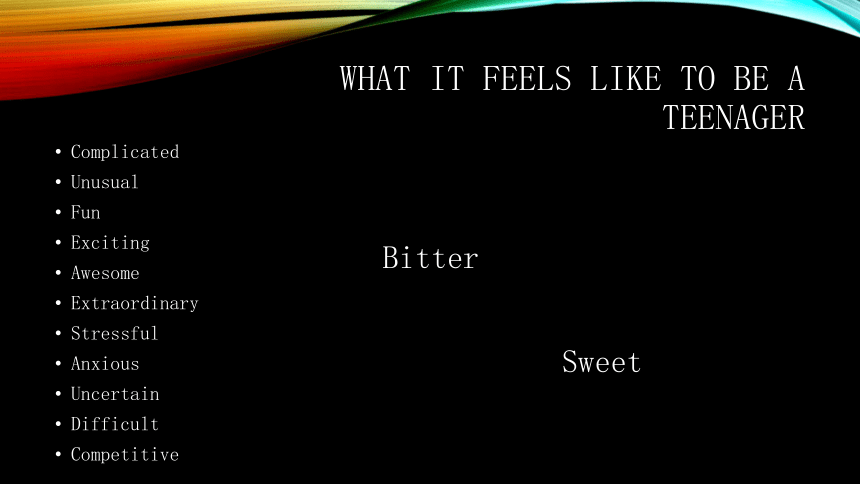
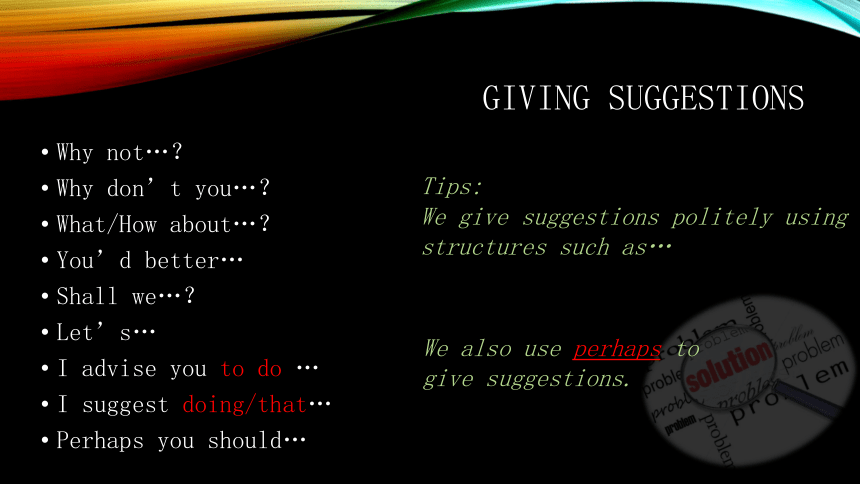
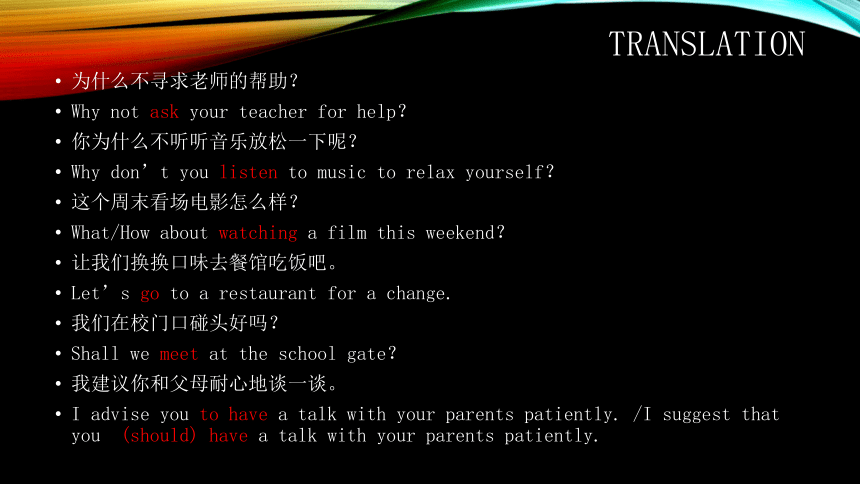
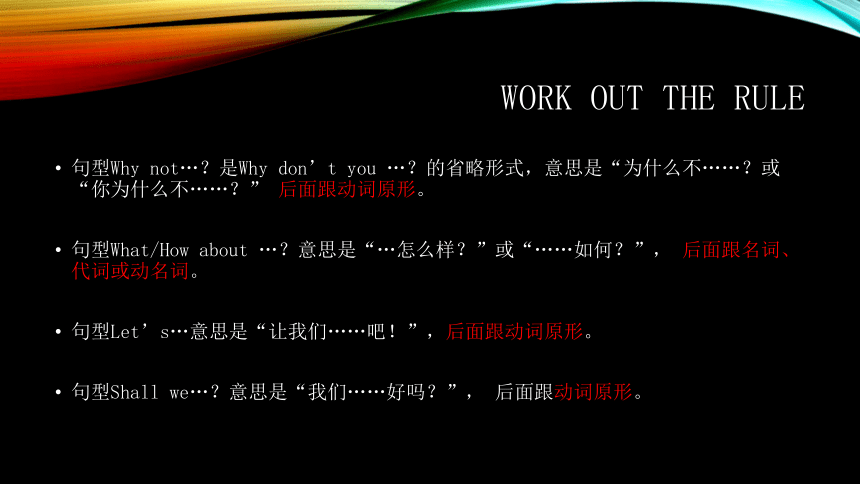
文档简介
(共35张PPT)
unit3 teenage problems
What does it feel like to be a teenager?
different problems
sleep
homework
noise
friends
marks
parents
obesity
myopia
bully
what it feels like to be a teenager
Complicated
Unusual
Fun
Exciting
Awesome
Extraordinary
Stressful
Anxious
Uncertain
Difficult
Competitive
Bitter
Sweet
giving suggestions
Why not…?
Why don’t you…?
What/How about…?
You’d better…
Shall we…?
Let’s…
I advise you to do …
I suggest doing/that…
Perhaps you should…
Tips:
We give suggestions politely using
structures such as…
We also use perhaps to
give suggestions.
translation
为什么不寻求老师的帮助?
Why not ask your teacher for help?
你为什么不听听音乐放松一下呢?
Why don’t you listen to music to relax yourself?
这个周末看场电影怎么样?
What/How about watching a film this weekend?
让我们换换口味去餐馆吃饭吧。
Let’s go to a restaurant for a change.
我们在校门口碰头好吗?
Shall we meet at the school gate?
我建议你和父母耐心地谈一谈。
I advise you to have a talk with your parents patiently. /I suggest that you (should) have a talk with your parents patiently.
work out the rule
句型Why not…?是Why don’t you …?的省略形式,意思是“为什么不……?或“你为什么不……?” 后面跟动词原形。
句型What/How about …?意思是“…怎么样?”或“……如何?”, 后面跟名词、代词或动名词。
句型Let’s…意思是“让我们……吧!”,后面跟动词原形。
句型Shall we…?意思是“我们……好吗?”, 后面跟动词原形。
let’s/let us in imperative sentence
let’s 开头的祈使句,反意疑问部分应用shall we。
咱们去购物,好吗?
Let’s go shopping, shall we?
以let us 开头的祈使句,反意疑问部分应用will you 。
让我们看看,好吗?
Let us have a look, will you ?
Predict the content from the title/the headings.(Often, they are in bold)
what should i do?
Sigmund Friend
Millie
Millie Wang
Simon Luo
Youth worker
what should i do
Problems
Lots of homework
Staying up late
Being hard to stay awake the next day
Not enough time for hobbies
Doubting whether it is worth spending so much time on homework
Problems
Being crazy about football
Strict parents
Wondering how he can achieve a balance between his schoolwork and his hobbies
something in common
balance
Plan her day carefully.
Make a list of all the homework she has.
Work out how much time she needs to finish it all.
Choose her hobby according to the time she has.
Enjoy his hobby, but don’t forget about his schoolwork.
Play football for an hour or two, and then go home.
language points
worth adj.(not before noun) (used like a preposition, followed by a noun, pronoun or number, or by the –ing form of a verb)用法同介词,后接名词、代词、数词或动词的-ing形式。
~sth having a value in money, etc. 有…价值;值…钱:
我们的房子大约值10万美元。
Our house is worth about $ 100000.
used to recommend the action mentioned because you think it maybe useful, enjoyable, etc. 值得,有价值:
这家博物馆的确值得参观。
The museum is certainly worth a visit.
~doing sth
这个想法很值得考虑。
This idea is well worth considering.
Antonym : worthless
language points
我怀疑David有没有和我们说实话。
I doubt if David told us the truth.
我们从不怀疑David是个诚实的人。
We never doubt that David is honest.
Tip: 句中的doubt表示“怀疑”,在肯定句中一般接if/whether引导的从句;在否定句中接that引导的从句。
我不知道该如何处理我的问题。
I don’t know how I should deal with my problem.
I don’t know how to deal with my problem.
I don’t know what I should do with my problem.
I don’t know what to do with my problem.
当宾语从句的主语和主句
的主语相同,且主句的谓语
动词是know , remember,
forget ,l earn等时,从句
可简化为“疑问词+不定式”
结构。。
object clauses introduced by that/if or whether
Tips:
We use that to introduce an object clause that
is a statement.
We use if or whether to introduce an object
clause that expresses a yes/no question.
object clauses introduced by question words
Tips:
We use a question word to introduce an object
clause that expresses a wh- question.
The word order in the clause should be the
same as that in a statement.
object clauses
Tips:
1、宾语从句的连接词
2、宾语从句的语序(先主语、后谓语)
3、主句与从句时态一致的问题
object clauses
(1)如果主句是现在的某种时态(包括一般现在时、
现在进行时、现在完成时),那么宾语从句的时态
可根据实际情况而定。
*我记得他昨天给了我一本书 。
I remember he gave me a book yesterday.
object clauses
(2)如果主句是过去的某种时态(包括一般过去时、
过去进行时),那么宾语从句一般要用过去的某种
时态(包括一般过去时、过去进行时、过去将来时、
过去完成时)。
*他告诉我他将会参加跳高。
He told me that he would take part in the high
jump.
object clauses
(3)如果宾语从句表示的是客观事实或真理,即使
主句是过去时,从句也要用一般现在时。
*他告诉我地球围着太阳转。
He told me that the earth goes round the sun.
practice makes perfect
他说凯特擅长游泳。
He said (that) Kate was good at swimming.
我不知道他们打算干什么。
I don’t know what they are going to do .
他问我这本书是谁的。
He asked me whose book this was.
practice makes perfect
你能告诉我你住在哪里吗?
Could you tell me where you live?
你知道他们是怎么找到那个地方的吗?
Do you know how they found the place?
他问我高小姐是不是一位老师。
He asked me if Miss Gao was a teacher.
if引导的条件状语从句和宾语从句的区别
1、我们不知道明天是否会下雨。如果下雨,我们
就不开运动会了。
We don’t know if it will rain tomorrow.
If it rains, we won’t have a sports meeting.
引导词that用于下列情况时不可省略
(1)当宾语从句为主从复合句时。
恐怕如果你丢了它,你必须赔偿。
I’m afraid that if you‘ve lost it, you must pay for it.
(2)当两个或多个宾语从句由并列连词连接时,除第一个从句中的that可以省略外,其余从句中的that都不可以省略。
他说这部电影非常有趣,并且他非常喜欢。
He said (that) the film was very interesting and that he enjoyed it very much.
a quiz --whether you know how to deal with problems
1. If you don’t get enough sleep and feel tired in class , you should_______.
A. sleep in class B. stay up late C. sleep earlier
2. If you don’t have time for your hobbies, you should ________.
A. drop the hobbies B. manage your time better C. get angry
3. If you don’t have any close friends and sometimes feel lonely, you should ________.
A. complain to your teachers B. keep it to yourself C. be more active
4. If your parents work all day. They don’t have time for you , you should________.
A. quarrel with them B. keep quiet C. talk to them
take time to relax
Stress hits teens hard…and they often don’t know how to deal with it
But when you don’t deal with stress, it builds…
And builds…
Don’t let stress get the best of you…
Take time to relax.
So how can you relax
to overcome them or to be overwhelmed
Life is full of problems. To overcome them or to be overwhelmed by them depends on you.
If you solve the problems, you will learn something from them.
Therefore, try your best to ask someone for help.
thank you
unit3 teenage problems
What does it feel like to be a teenager?
different problems
sleep
homework
noise
friends
marks
parents
obesity
myopia
bully
what it feels like to be a teenager
Complicated
Unusual
Fun
Exciting
Awesome
Extraordinary
Stressful
Anxious
Uncertain
Difficult
Competitive
Bitter
Sweet
giving suggestions
Why not…?
Why don’t you…?
What/How about…?
You’d better…
Shall we…?
Let’s…
I advise you to do …
I suggest doing/that…
Perhaps you should…
Tips:
We give suggestions politely using
structures such as…
We also use perhaps to
give suggestions.
translation
为什么不寻求老师的帮助?
Why not ask your teacher for help?
你为什么不听听音乐放松一下呢?
Why don’t you listen to music to relax yourself?
这个周末看场电影怎么样?
What/How about watching a film this weekend?
让我们换换口味去餐馆吃饭吧。
Let’s go to a restaurant for a change.
我们在校门口碰头好吗?
Shall we meet at the school gate?
我建议你和父母耐心地谈一谈。
I advise you to have a talk with your parents patiently. /I suggest that you (should) have a talk with your parents patiently.
work out the rule
句型Why not…?是Why don’t you …?的省略形式,意思是“为什么不……?或“你为什么不……?” 后面跟动词原形。
句型What/How about …?意思是“…怎么样?”或“……如何?”, 后面跟名词、代词或动名词。
句型Let’s…意思是“让我们……吧!”,后面跟动词原形。
句型Shall we…?意思是“我们……好吗?”, 后面跟动词原形。
let’s/let us in imperative sentence
let’s 开头的祈使句,反意疑问部分应用shall we。
咱们去购物,好吗?
Let’s go shopping, shall we?
以let us 开头的祈使句,反意疑问部分应用will you 。
让我们看看,好吗?
Let us have a look, will you ?
Predict the content from the title/the headings.(Often, they are in bold)
what should i do?
Sigmund Friend
Millie
Millie Wang
Simon Luo
Youth worker
what should i do
Problems
Lots of homework
Staying up late
Being hard to stay awake the next day
Not enough time for hobbies
Doubting whether it is worth spending so much time on homework
Problems
Being crazy about football
Strict parents
Wondering how he can achieve a balance between his schoolwork and his hobbies
something in common
balance
Plan her day carefully.
Make a list of all the homework she has.
Work out how much time she needs to finish it all.
Choose her hobby according to the time she has.
Enjoy his hobby, but don’t forget about his schoolwork.
Play football for an hour or two, and then go home.
language points
worth adj.(not before noun) (used like a preposition, followed by a noun, pronoun or number, or by the –ing form of a verb)用法同介词,后接名词、代词、数词或动词的-ing形式。
~sth having a value in money, etc. 有…价值;值…钱:
我们的房子大约值10万美元。
Our house is worth about $ 100000.
used to recommend the action mentioned because you think it maybe useful, enjoyable, etc. 值得,有价值:
这家博物馆的确值得参观。
The museum is certainly worth a visit.
~doing sth
这个想法很值得考虑。
This idea is well worth considering.
Antonym : worthless
language points
我怀疑David有没有和我们说实话。
I doubt if David told us the truth.
我们从不怀疑David是个诚实的人。
We never doubt that David is honest.
Tip: 句中的doubt表示“怀疑”,在肯定句中一般接if/whether引导的从句;在否定句中接that引导的从句。
我不知道该如何处理我的问题。
I don’t know how I should deal with my problem.
I don’t know how to deal with my problem.
I don’t know what I should do with my problem.
I don’t know what to do with my problem.
当宾语从句的主语和主句
的主语相同,且主句的谓语
动词是know , remember,
forget ,l earn等时,从句
可简化为“疑问词+不定式”
结构。。
object clauses introduced by that/if or whether
Tips:
We use that to introduce an object clause that
is a statement.
We use if or whether to introduce an object
clause that expresses a yes/no question.
object clauses introduced by question words
Tips:
We use a question word to introduce an object
clause that expresses a wh- question.
The word order in the clause should be the
same as that in a statement.
object clauses
Tips:
1、宾语从句的连接词
2、宾语从句的语序(先主语、后谓语)
3、主句与从句时态一致的问题
object clauses
(1)如果主句是现在的某种时态(包括一般现在时、
现在进行时、现在完成时),那么宾语从句的时态
可根据实际情况而定。
*我记得他昨天给了我一本书 。
I remember he gave me a book yesterday.
object clauses
(2)如果主句是过去的某种时态(包括一般过去时、
过去进行时),那么宾语从句一般要用过去的某种
时态(包括一般过去时、过去进行时、过去将来时、
过去完成时)。
*他告诉我他将会参加跳高。
He told me that he would take part in the high
jump.
object clauses
(3)如果宾语从句表示的是客观事实或真理,即使
主句是过去时,从句也要用一般现在时。
*他告诉我地球围着太阳转。
He told me that the earth goes round the sun.
practice makes perfect
他说凯特擅长游泳。
He said (that) Kate was good at swimming.
我不知道他们打算干什么。
I don’t know what they are going to do .
他问我这本书是谁的。
He asked me whose book this was.
practice makes perfect
你能告诉我你住在哪里吗?
Could you tell me where you live?
你知道他们是怎么找到那个地方的吗?
Do you know how they found the place?
他问我高小姐是不是一位老师。
He asked me if Miss Gao was a teacher.
if引导的条件状语从句和宾语从句的区别
1、我们不知道明天是否会下雨。如果下雨,我们
就不开运动会了。
We don’t know if it will rain tomorrow.
If it rains, we won’t have a sports meeting.
引导词that用于下列情况时不可省略
(1)当宾语从句为主从复合句时。
恐怕如果你丢了它,你必须赔偿。
I’m afraid that if you‘ve lost it, you must pay for it.
(2)当两个或多个宾语从句由并列连词连接时,除第一个从句中的that可以省略外,其余从句中的that都不可以省略。
他说这部电影非常有趣,并且他非常喜欢。
He said (that) the film was very interesting and that he enjoyed it very much.
a quiz --whether you know how to deal with problems
1. If you don’t get enough sleep and feel tired in class , you should_______.
A. sleep in class B. stay up late C. sleep earlier
2. If you don’t have time for your hobbies, you should ________.
A. drop the hobbies B. manage your time better C. get angry
3. If you don’t have any close friends and sometimes feel lonely, you should ________.
A. complain to your teachers B. keep it to yourself C. be more active
4. If your parents work all day. They don’t have time for you , you should________.
A. quarrel with them B. keep quiet C. talk to them
take time to relax
Stress hits teens hard…and they often don’t know how to deal with it
But when you don’t deal with stress, it builds…
And builds…
Don’t let stress get the best of you…
Take time to relax.
So how can you relax
to overcome them or to be overwhelmed
Life is full of problems. To overcome them or to be overwhelmed by them depends on you.
If you solve the problems, you will learn something from them.
Therefore, try your best to ask someone for help.
thank you
